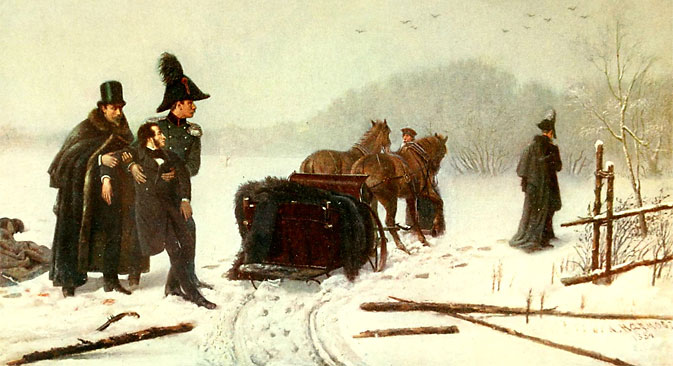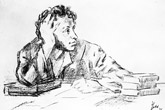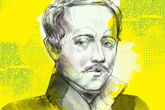The final days of Russian writers: Alexander Pushkin and Mikhail Lermontov

A. Naumov. Duel of Alexander Pushkin and Georges d'Anthès. 1884
Honor or life – that was the question
One winter's afternoon, in the woods on the outskirts of Saint Petersburg, two men stood ten paces apart aiming their gleaming pistols at each other. Baron Georges H. d'Anthès, a French officer on Russian service, shot first. The bullet went through his opponent's stomach, and poet Alexander Pushkin plummeted on to the snow. His attendants took the poet to his house in a sleigh. One of the doctors confirmed that Pushkin would not survive. "It is finished. I am going. I can hardly breathe. I'm suffocating," the poet told his friends. After forty-eight hours of agony, the Russian poet closed his eyes for the last time.
Bronze-skinned with curly hair, Pushkin was a descendant of an Abyssinian slave in the service of Peter the Great. He was Russia’s foremost poet and was called his “nation’s glory.” Pushkin wanted above all else to be a free poet: "Whom shall we serve ― the people or the State? The poet does not care― so let them wait.”
And his defiance earned him periods of exile, many enemies and an uncomfortable relationship with Tsar Nicholas I, who, apart from his royal duties, watched closely over the pens of his writers.
Pushkin was an indefatigable Don Juan. His marriage to Natalia Goncharova was received with relief. Finally, his devotees assumed l'enfant terrible would settle down. But it turned out that marriage only brought new difficulties.
Drowning in card debts, Pushkin had to accept the court appointment of valet, which meant, among other duties, that he had to attend the palace balls with his Natalia. But his wife was an irresistible temptation, not only for the nobles, but even for the Tsar himself. Nicholas I may have been a Romanov but Pushkin was the king of jealousy! This tight situation made Pushkin desperate. He wanted to retire from the court.
At this point, he received an anonymous letter, which informed him that an “Order of Cuckolds” had the “honor” of appointing him official historian. The culprit for his stained honor was none other than Georges-Charles de Heeckeren d'Anthès, a fop whose aim was to conquer Pushkin’s wife Natalia. The poet felt he had no choice but to challenge his offender to a duel.
The news of Pushkin’s death brought together a large crowd in front of his house in St. Petersburg. As Vasiliy Zhukovsky, Pushkin’s friend and a famous writer, recalled, common people of St. Petersburg wanted desperately to take revenge on d’Anthes, and foreigners in general.
“They even wanted to punish the surgeons who treated Pushkin, arguing that conspiracy and treason are apparent, that one foreigner wounded Pushkin, and other foreigners were summoned to cure him”. That is why Nicholas I ordered police protection for Pushkin’s house and concealed the plans for the poet’s funeral. He was buried in the darkness of the night and with great haste at Svyatogorsky monastery (245 miles from St. Petersburg), near his family estate.
An unexpected death
After Pushkin's demise, young poet and cavalry officer Mikhail Lermontov in his poem “Death of the poet” blamed the absurd customs of high society for being complicit in Pushkin’s murder. Because of that, Tsar Nicholas sent Lermontov to the Caucasus, which was in the state of war at the time, thinking the exile would bring some sense to the subversive young poet. But when Lermontov returned from the Caucasus, he was already famous – not only for his daredevil attitude, but also for his multiple works.
In 1841 the poet went back to the Caucasus. In the town of Pyatigorsk there, Lermontov met Nikolay Martynov, his old comrade in arms and a simple fellow, who desperately wanted to socialize among local noble maidens, parading in Caucasian military uniform. Harsh and dismissive even with his friends, Lermontov chose Martynov as an aim for his bitter and insulting jokes. But Martynov was patient – until the poet started to mock him in front of women. And that was it – old friends decided on a duel.
On July 15, in the foothills of Mashuk Mountain, Lermontov deliberately missed. But Martynov struck his target. The 27-year-old poet was killed on the spot. It is said that immediately a great storm broke out. Under the torrential rain, in the company of a single friend, his body remained at the mercy of the elements for several hours. “A dog's death for the dog,” Tsar Nicholas said upon receiving the news. But minutes later, he added: “The one who could take the place of Pushkin, is dead.”
Two days later, without even holding a religious ceremony (those who had died in a duel were not allowed a service), the poet was buried in Pyatigorsk cemetery where a multitude came to pay their last respects. Later, Lermontov's body was taken to the family vault in the Tarkhany estate (province of Penza).
The astonishing fact is that in his most renowned novel, “A Hero of Our Time.” finished a year before his death, Lermontov describes a duel between the protagonist, named Pechorin, and a careless tattler Grushnitsky, a character very much like Martynov. In the novel, Pechorin kills Grushnitsky. The real life turned out to be exactly the opposite.
Read more about the final days of Russian writers:
Nikolai Gogol and Anton Chekhov
Alexander Blok and Nikolai Gumilev
Sergey Esenin and Vladimir Mayakovsky
All rights reserved by Rossiyskaya Gazeta.
Subscribe
to our newsletter!
Get the week's best stories straight to your inbox



